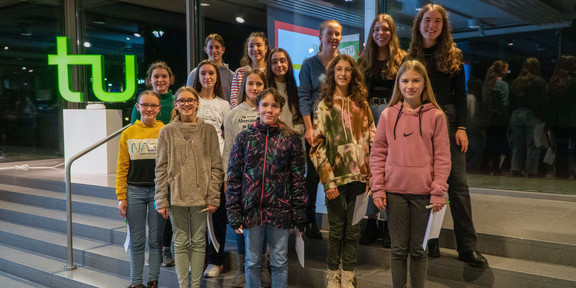Festive end to the project round at MinTU


Jill Timmreck, MinTU project coordinator, asked right at the beginning: What was actually the best thing about MinTU this year? The girls are certain: they haven't experienced so many exciting things in a long time. The girls tried out VR goggles, learned about different types of 3D printing and built a rocket. And they also made new friends. "We don't come from the same school, some of us aren't even from Dortmund. That's very cool," said one participant. The parents also sensed that the girls enjoyed their time at MinTU. "Our daughter was very enthusiastic when she came home from the workshops. It was really nice to see. She's always rather bored at school," said one father.
Practice makes you want to do STEM
Our own voice sounds very different in voice messages on our cell phones than we hear ourselves. Why is that? Jo Hecker, scientist and science journalist, not only explained that our heads conduct sound very well (this is called bone sound) and that we therefore hear ourselves differently in our heads. With the help of a stethoscope and a microphone, he allowed the guests to listen and participate in what the voice sounds like that only each individual knows about themselves. "Your parents have never heard you like this before!" he said.
To illustrate the sound of bones even better, three girls were allowed to chew peanuts, rusks and a hazelnut wafer. In the hall, it sounded as if a thunderstorm was brewing or a bomb was exploding. Jo Hecker then explained that there is a special profession called food acoustician. They explicitly deal with the acoustics of food in order to positively influence purchasing and consumer behavior through the right sound.
Hecker then built a cyborg, a mixture of human and machine. "You're a cyborg right now, Anna-Sophie!" he said as he fitted her arm with electrodes. "Great, I've always wanted to be one!" Anna-Sophie replied with a laugh and a twinkle in her eye.
Jo Hecker's experiment show made the audience understand the world a little better and showed that science is fun.
Why MinTU?
MinTU wants to encourage girls to consider careers in the STEM sector. After all, many girls still tend to opt for "female professions" and boys for "male professions". Girls often lack female role models. This is why female students from the STEM departments at MinTU work as mentors (STEMfluencers). They can tell the younger students about their experiences and give them tips for their studies.





